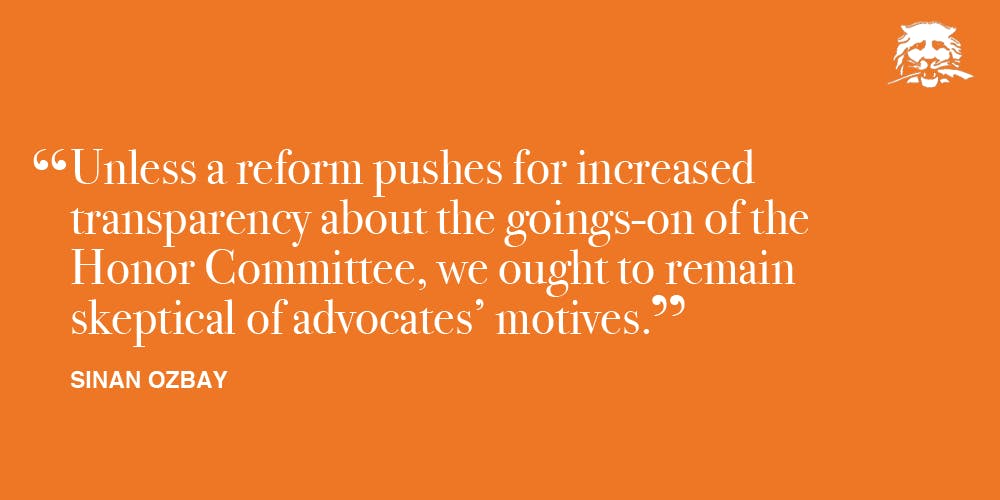In this year’s first round of Honor Committee reforms, reform advocates advanced an interesting line of attack favoring a weaker Honor Committee. “Anyone so eager to punish their peers that they would join the Honor Committee,” the thought went, “must be as vicious as they are retributive. Therefore, we shouldn’t trust them with very much power at all.” If this suspicion is legitimate, it seems that we would do well to extend it to another group of students on campus: USG. Indeed, the student government was remarkably active in the last round of reform, with most members staunchly supporting it. Any way that you frame it however, USG’s support for reform was self-interested — either an attempt to improve its image or to expand its campus prerogatives. Claims of caring for the student body as reasons for supporting the reform are disingenuous or deluded.
To begin, consider the obvious realities surrounding the Honor Committee. These give light to the utter absurdity of anyone pushing for reform of almost any stripe. The average student knows little to nothing about the goings-on of the Honor Committee. This is in practice result of apathy. Yet, even in principle, the well-maintained opacity of Honor Committee proceedings ensures that students will never have more than a very general sense of what goes on in hearings. It is therefore baffling that anybody, much less those from USG who know better, could in good faith push for student referenda to change the contents of the rules.
When students vote on change to the Honor Code, they aren’t privy to how many students are annually accused of cheating, taken to trial, or found guilty, just to name a handful of the most basic facts one would need to know to be informed. How could any student possibly make an informed decision on the matter of changing rules about which they have close to no information? Would they decide based on a metric of what seems more compassionate? Blind good-faith? Abstract intuitions about justice? None of these metrics are even close to acceptable. Without knowledge of the size of the changes students stand to enact through Honor Code reform, or indeed a good sense of how the committee would react to changes, students may be voting directly against their interests, or worse, the interests of their peers. The votes can be cathartic, but nobody can justifiably claim that they are sure more good is done than harm by changing the rules, even in what seem to be the most obvious cases. For instance, what is presented as a reform to reduce standard penalties might compel the Committee to start hearing more cases and in turn, to punish more people than before. This is precisely the sort of thing we cannot know.
The upshot of all this is very clear. Nobody, no less a member of student government, can push for reform in the name of helping students without being severely dishonest about their intentions. Nor can anyone claim altruistic motives even if they’ve served on the committee itself. For all we know, they are assessing the additional information they have incorrectly. Unless a reform pushes for increased transparency about the goings-on of the Honor Committee, we ought to remain skeptical of advocates’ motives. When I see reform laptop stickers reminiscent of presidential campaigns and well-edited profile pictures that make Honor Code reform look more like a push to save Syrian children than an effort to change the mundane academic standards at a university, I can’t help but feel we’re being misled.
In any case, the many members of USG — advocates for reform themselves — were evidently unashamed of their motives for reform. In a recent news article about the new reform, the president of USG herself, Rachel Yee ’19, said that the referendum will emphasize how important USG elections are, due to the role USG will have in arbitrating the evaluation committee that reviews the clerk or chair. As a decidedly twisted logic for reform, this is the kind of admission I’d expect to be made only behind closed-doors. USG elections are not currently important, and this is mostly a function of how little power is vested in student government. The reform in question promised to include the USG in the power politics of the Honor Committee. This would, in turn, make USG elections important. Is the end-goal of reform to make USG important and relevant? Surely not. Yet, it is decidedly in the interests of USG for it to be just that.
There is a great deal of opacity surrounding the Honor Committee. Perhaps this is by necessity, perhaps it is something we can change. But in the face of that opacity, the disingenuous proposals we’ve been given as reform options tell us very little about what would happen to students who are punished here, and much more about the motives of those who tout reform.
Sinan Ozbay is a junior studying philosophy from Princeton, N.J. He can be reached at sozbay@princeton.edu.








